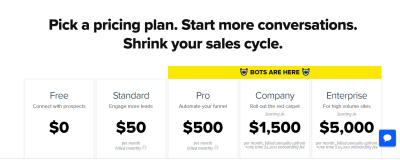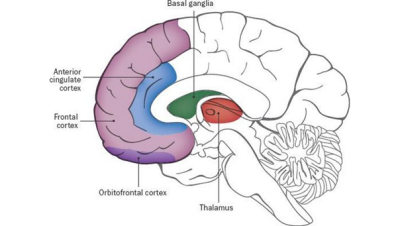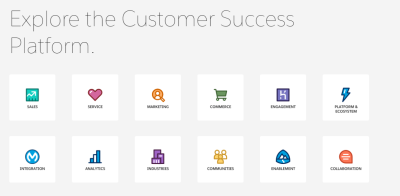How Does Facebook Decide on People You May Know
(This article is sponsored by Adobe.) Kelly'due south in accuse of choosing IT deject services at her company. She has signed the company up for a chatbot service, and has had the "Pro" level service (non the "Free" or "Standard") for 2 years.
It's time for the almanac renewal. Volition she renew? Will she determine to renew, but switch to the free service only? Is there anything nigh the email find and/or webpage for the service that will either encourage her or discourage her from renewing?

There is a lot of research on human controlling. Here are some of my favorite insights from the research.
Near Decisions Are Not Made "Logically"
We like to call back that nosotros are logical and that when we are making a conclusion, nosotros carefully weigh all of our alternatives. When information technology's fourth dimension to purchase a new car, do we read all the specs and reviews, and cull the i that is the safest and virtually economic? When it'south fourth dimension to renew the chatbot service, does Kelly do a study to see how much use she has made of the "Pro" services and evaluate whether she should stay with that level and pay that corporeality each month?
These would be the logical ways to make the conclusion, and although nosotros sometimes make decisions rationally and logically, in that location are hundreds of decisions we make every day, and we don't exercise a logical call back through of every one. Even the big decisions where nosotros recall we are being logical, the inquiry shows that nearly of our decisions — big or small — are made unconsciously and involve emotion.
Here are some facts about decisions that may surprise you.
Most Of Our Decisions Are Fabricated Unconsciously
By looking at brain activity while making a determination, researchers could predict what choice people would make 7-10 seconds before they themselves were even aware of having made a decision. This means that fifty-fifty when people think they are making a conscious, logical, determination, chances are that they aren't aware that they've already made a decision and that it was unconscious. We aren't even aware of our own process.
Exercise you write your messaging and content to appeal to logical thinking?
If and so, it'due south possible and fifty-fifty likely that your logical, persuasive arguments to your target audience about why they should go with the premium service, or why they should purchase a item product may be in vain.
Exist suspicious of what people say.
Some other problem is that if you are diligent in your design process and enquire people what factors are important to them, y'all might not be getting a true answer.
For example, if someone interviewed Kelly and asked her why she chooses the "Pro" level each year, it is likely that she volition come up up with an answer that sounds very logical (i.e. nigh the service, how her company uses it and and then on) when the real reason she stays with "Pro" rather than the "Gratis" plan may be emotional ("I don't desire to have things go wrong and if I pay money things won't go wrong") or just addiction ("It's what we always sign upwardly for"). What people tell you lot is the reason for why they do what they do may not be the actual reason.
People need to feel in guild to determine.
If y'all can't feel emotions, then you tin't make decisions — thanks to our ventro-medial pre-frontal cortex (or 'vmPFC').
The vmPFC is part of the prefrontal cortex, i.e. the forepart of your brain. Information technology is of import in regulating fear. Other parts of your brain (in particular the amygdala) tell you when yous should be afraid and what you should exist agape of. The amygdala is where "conditioned" fear responses are born and perpetuated. The vmPFC, in dissimilarity, has an opposite role. It mitigates conditioned fear. It stops you lot from continuing to be agape in certain situations. When the vmPFC is agile and so you are able to let go of conditioned fears. Every bit a outcome, you are and so able to make a determination.
You should just presume that all decisions involve emotions. Rather than simply making logical arguments to persuade, y'all are more likely to persuade people to take an activeness if yous sympathise how they are feeling virtually the decision and feed their feeling. For instance, if Kelly is feeling humble virtually making a wrong decision so your messaging should exist more than about making her feel secure and safe than it is well-nigh production features.
People buy when they feel confident of their decision.
In that location is actually a neuron that fires up in the encephalon that triggers people to take action when the brain decides it is confident of a decision. This is subjective. It'due south not necessarily based on the corporeality of information you lot've collected — it's a feeling of confidence.
If y'all want people to take an action then y'all demand to make them experience confident. If you lot desire Kelly to cull the "Pro" level once more, then you need to give her messaging about the "Pro" version that makes her confident of her choice. For example, feed data dorsum to her about how much she has used the service. This will brand her feel confident that she is making the correct option.
Don't Confuse Unconscious With Irrational Or Bad
I accept exception with writers who equate unconscious decision making with making poor or irrational decisions. For example, Dan Ariely in his book, "Predictably Irrational: The Hidden Forces That Shape Our Decisions" implies that unless we work hard to foreclose it, many to most of our decisions are poor and irrational.
Most of our mental processing is unconscious, and nigh of our conclusion-making is unconscious, but that doesn't mean information technology'due south faulty, irrational, or bad. We are faced with an overwhelming amount of data (11,000,000 pieces of data come into the brain every second according to Dr. Timothy Wilson in his book "Strangers To Ourselves: Discovering The Adaptive Unconscious") and our conscious minds can't procedure all of that.
Our unconscious has evolved to process nearly of the data and to make decisions for us according to guidelines and rules of thumb that are in our best interest most of the fourth dimension. This is the genesis of "trusting your gut", and nearly of the time it works!
People exercise like to think that they are existence logical and thorough, however, so you may want to offer logical reasons for why a certain decision should be made so that the person making the conclusion has a rational reason they tin give themselves and others. Go ahead and give Kelly the rational reasons she should renew for the "Pro" level, but just understand that that reason is probably not the actual reason.
Recommended reading: Grabbing Visual Attending With The Visual Cortex
Only Give More Information If People Are Making A Goal-Based Conclusion
At that place are two different types of decisions that people brand. Value-based decisions are fabricated in the orbitofrontal cortex (OFC). Then, during those times when y'all really are comparing the Honda to the Subaru when you are shopping for a car, and then you are making a value-based goal determination. If Kelly was comparing the features of the dissimilar levels for the chatbot service so she would exist making a value-based goal determination.
Habit-based decisions occur in the basal ganglia (deep in the brain). When you pull your usual cereal off the shelf at the grocery store and put it in your cart, that's a habit-based decision. If Kelly presses the 'Renew' button for the Chatbot software so she is making a habit-based decision.
What's interesting is that if the OFC is quiet then the habit function of the brain takes over. This ways that people are either making a goal-directed decision or a habit conclusion, just not both at the same time.

If you requite someone a lot of information then they will switch from habit to goal-directed. So if you want someone to make a habit determination, don't give them too much information to review. If you want them to make a goal-directed determination then practise give them information to review.
If you want Kelly to renew for the "Pro" level then don't requite her lots of data. Let her make the habit-based conclusion to renew. If yous are hoping that she will go upwards a level (not down) and then you may desire to requite her data on her options as that will kick her from a habit conclusion to a goal-directed decision.
Also Many Choices Means People Won't Choose
You may have heard the idea that people can only retrieve, or deal with 7 plus or minus 2 things at a time (five to 9). This actually is not true. It was a theory first mentioned by Miller in 1956 at a talk he gave at the American Psychological Association meeting. But research since and so shows that 7 +- 2 is a myth. The real number is iii-4 not v-9. Refuting research includes:
- "The Magical Number four In Short-Term Memory: A Reconsideration Of Mental Storage Capacity," Nelson Cowan, Behavioral and Brain Sciences (2001)
- "The Magical Number Seven: Still Magic After All These Years?," Alan Baddeley, Psychological Review (1994)
- "The Magic Number Vii After Fifteen Years," Donald Broadbent, Wiley (1975)
And most recently, Sheena Iyengar (author of "The Art Of Choosing"), has conducted several studies that clearly show that if you give people besides many choices then they finish up not choosing anything at all.
People liked having more choices to choose from only they were more satisfied with their pick when there was less to choose from.
And then, if y'all prove someone too many choices (in this case of sales/CRM services) they might non choose whatever and instead abandon the page.

Kelly was given 5 choices for the Chatbot service. Three to four would have been better.
So, is there annihilation y'all can do to encourage Kelly to re-subscribe and not alter her level of membership?
In this example, the decision is probably a addiction-based decision. The all-time thing to exercise, then, is to not practice much at all. Don't send her an email with information on all the membership levels. Instead, requite her one or two reasons why standing with her current subscription is the manner to go and exit it at that. At a dissimilar time (not when she is deciding whether to renew), you can make a pitch for a higher premium level. But if you do that pitch while she is about to renew, yous may jeopardize her habit-based renewal.
Recommended reading: Don't Let Your Brain Deceive Y'all: Fugitive Bias In Your UX Feedback
Takeaways
- If someone is making a habit-based decision, practice not give them a lot of information.
- Provide people with a brief, just a logical reason for their decision so they can use that to tell themselves and others why they did what they did.
- Limit the number of choices people have to make to i, two or three. If you provide too many choices then people likely won't choose at all.
This commodity is role of the UX design series sponsored by Adobe. Adobe XD tool is made for a fast and fluid UX pattern process, equally it lets you get from idea to epitome faster. Design, prototype and share — all in i app. You lot can cheque out more inspiring projects created with Adobe XD on Behance, and also sign up for the Adobe feel design newsletter to stay updated and informed on the latest trends and insights for UX/UI design.
![]() (cm, ms, ra, il)
(cm, ms, ra, il)
Source: https://www.smashingmagazine.com/2019/02/human-decision-making/
Post a Comment for "How Does Facebook Decide on People You May Know"